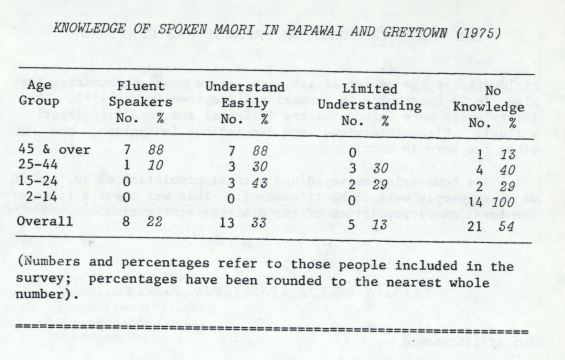-
Ngā Karere me Ngā Rauemi
News and Resources
Ngā Karere me Ngā Rauemi
News and Resources
-
Te Rangaihi Reo Māori
The Movement
Te Rangaihi Reo Māori
The Movement
-
Te Pae Kōrero
Our Community
Te Pae Kōrero
Our Community
-
Huihuinga
Events
Huihuinga
Events
-
Ngā Ara Ako
Learning Pathways
Ngā Ara Ako
Learning Pathways
-
SearchSearch
Search
Search

Many people were worried that fewer people in the area could speak Maori. They felt that the language could be lost completely unless something was done to bring it back as a language for everyday use in the home and community. Most of the people in the survey had been brought up in households where mainly English was spoken. Their parents had been told that knowing English well was better than knowing Maori. Many of these people were now sorry they had never learned Maori and, that because of this they could not teach it to their own children. Some people were angry because English was almost the only language used in the community, in all government departments, in schools, and on radio and television. They thought that plans were still about to wipe out the Maori language completely, or to see that it was used only in ceremonies on the marae. Many people wanted to bring back Maori as a language for everyday use, but they knew it could not be done unless it was taught in schools. They believed it could survive only if most people in the community, Maori and Pakeha, wanted it to survive.
Te Whanganui-a-Tara | Wellington | South Wairarapa | 1970-79 | 5% of Māori children can speak te reo. (1970-75) | Story is by tangata whenua
















Comments